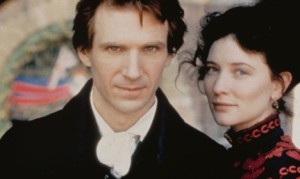 Once in a great while a film will defy expectations by delivering the richness and unique characters that we usually only find in novels. Such is the case with Oscar and Lucinda, a 1997 film by Australian director Gillian Armstrong It’s a drama with the look and feel of a period epic that at the same time focuses on the odd, private affections of a couple of misfits.
Once in a great while a film will defy expectations by delivering the richness and unique characters that we usually only find in novels. Such is the case with Oscar and Lucinda, a 1997 film by Australian director Gillian Armstrong It’s a drama with the look and feel of a period epic that at the same time focuses on the odd, private affections of a couple of misfits.
The affectionate, humorous tone of the film is set firmly by the narrator (the voice of Geoffrey Rush)—a great-great grandson telling the story of his forbears from the 1840s. This device works well because the distance of time allows us to observe the drama with more compassion than the characters may have for themselves or one another. Another interesting aspect is that the title characters don’t even meet each other for quite some time—we follow their lives separately, Oscar in England and Lucinda in Australia, so that when they finally do meet there is an amusing fatefulness to the scene.
Oscar (Ralph Fiennes) is the son of a strict Puritan father. He defects to the Church of England early on and goes to school to become a priest. Several events confirm a tendency in him to regard chance as an instrument of God’s will, and when a roommate introduces him to the racetrack, he gradually becomes a compulsive gambler.
Lucinda (Cate Blanchett) a young woman who grows up on an Australian farm, “a proud square peg in a world of round holes,” says the narrator, becomes a reluctant heiress, investing her money in a Sydney glass factory and, along the way, developing an addiction to betting on card games. Of course these two gamblers eventually meet and develop a curious relationship. Then the story takes some even more unusual turns.
The screenwriter, Laura Jones, has adapted a Peter Carey novel with finesse and faithfulness to detail. I was captivated by Gillian Armstrong’s confident, fluid direction. The switching back and forth between the two main characters’ stories is not done rigidly, but with a kind of jaunty, impish rhythm that held my attention and sympathy. From scenes of city life to an extended sequence in the Australian outback, the picture is beautifully shot and framed.
Ralph Fiennes showed some real courage here: Oscar is a very odd character indeed, a hyper-sensitive and utterly introverted eccentric. Fiennes is willing to go out on a limb and invite us to follow him through the bizarre reasonings and states of mind of a man whose religious sense is founded on the idea of a wager, a man who takes absurd risks for the sake of a love he only half understands. Cate Blanchett, seen here a couple of years before her breakthrough as a big star, brings an intense emotionality to her role that doesn’t seem studied—her personal magnetism and intelligence give the picture an added spark.
There is much to laugh about as these two struggle with their own impulses and against the censure of society. I like the way the movie accepts their neuroses as part of their attractiveness, instead of making them pitiful or tragic. Armstrong stays focused on her subject, which is love, and the ways in which love can be a tremendous gamble, taking on the nature of a mistake or misfortune, even in fulfilling itself. The wonderful Oscar and Lucinda may not have done that well at the box office, but I think it’s Armstrong’s most interesting film. It’s available on DVD.

